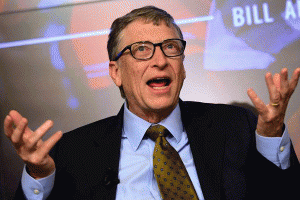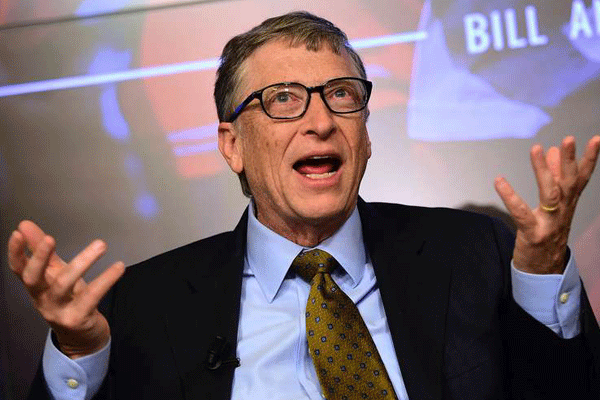
Mr William Henry Gates III (better known as Bill Gates), the American tycoon, has struck again. On January 22, he informed the Wall Street Journal that Kenya had legalised the cultivation of genetically engineered maize.
Armed with an amount of money he cannot spend in more than 56,000 lifetimes at the cost of his current lifestyle, Mr Gates decided to make this announcement on the sidelines of the World Economic Forum in Davos, Switzerland.
By that announcement, he, seemingly awestruck by the scorching capacity of capitalism and seductive lures of technology, sanctioned the subjection of human and natural systems to adventurous pet experiments in the name of practising philanthropy.
In the meantime, famished and mesmerised poor folk continue to drool at the thought of the wealth of the likes of Mr Gates as global wealth continues to be shared by a small cabal.
Worth $79.2 billion by last year and in no need for more money, Mr Gates must be finding life full of mind-numbing boredom. So, what to do?
Usually, the richest among us spend their lives in ostentatious expenditure. They engage in accumulation of parcels of lands they will never cultivate; homes they will hardly inhabit; stashing billions in foreign lands; using bagfuls of it on personal aggrandisement.
Some find it worthwhile to buy political power reputed by some as the highest form of wealth.
But for Mr Gates, money is a means of influencing the “cause” of humanity. And so the founder of Microsoft Corporation pumped some $28 billion and later coaxed his buddy, Warren Buffet, to boost the kitty, resulting in a whopping $41 billion (Sh4.18 trillion). He now uses this money to “improve people’s health and (to) give them the chance to lift themselves out of hunger and extreme poverty”.
POOR COUNTRIES
Kenya is one of the “poor” countries targeted by Mr Gates and his wife, Melinda. But the two are not keen to give us cash to alleviate poverty the Kenyan way. Instead, they have been keen to control how we, and fellow Africans, live and do our things.
They do this through what the Bill & Melinda Gates Foundation terms “strategic relationships” with governments and other policymakers.
They also deploy foreign experts to oversee what our farmers grow; how we achieve our national health agenda; the type and nature of vaccines we give to our children and so on.
By pumping billions to promote “agricultural development”, Mr Gates is chiefly interested in getting Kenya and other African countries to adopt genetically engineered crops and related technologies without any regard to our traditional agricultural practices and food production norms.
Scientists at the Kenya Agricultural and Livestock Research Organisation (Kalro) have helped in this. Jointly with their counterparts from the African Agricultural Technology Foundation, Kalro scientists claimed last year that they had developed genetically engineered maize varieties that can withstand drought and pests through the Water Efficient Maize for Africa project (Wema).
They later asked the National Biosafety Authority to allow farmers to start growing the maize.
What nobody said is that Mr Gates pumped into the Wema research some $85.7 million (Sh8.7 billion); the Howard G. Buffett Foundation gave $7.9 million (Sh806 million)) while USAid devoted US$7.5 million (Sh705 million). This amounts to Sh10.2 billion; a sum that can comfortably fund the construction of some 1,244 boreholes.
But the fraternity of the ultra-rich is not interested in boreholes. Instead, they plan to have 300 million farmers in Kenya, Mozambique, Uganda, Tanzania and South Africa start growing genetically engineered maize developed under Wema. This is done, ostensibly to enable us have reliable supply of ugali. But is what Mr Gates and other super-rich fellows done devoid of self interest?
ACTS OF CHARITY
We need to remember that capitalism has institutionalised the act of giving. It requires those sitting at the apex of humanity’s primitive accumulation to engage in some benevolence; private acts of charity through which they can get some tax relief in their mother countries.
Most importantly, evidence shows that as they give out such immense amounts, super-rich fellows end up controlling how societies are run.
They achieve this by influencing national policies and laws, thereby undermining the mandate of Kenya and other African states to cater for the wellbeing of citizens.
Governments are then shunned; democracy is thrown out of the window, while what matters to millions is ignored at the altar of securing interests of rich nations and multinational companies.
This is an issue ably covered by two UK nationals, Jens Martens & Karolin Seitz, in a study called “Philanthropic Power and Development; Who Shapes the Agenda”. Conducted last November, the study shows how Mr Gates has routinely used tonnes of cash to set the agenda in poor countries.
They say the Gates Foundation invests heavily in companies such as Monsanto, Bayer and other multinationals and show how it pushes through the throats of unwitting African countries technological and market-based approaches in agricultural development and health sectors. Such approaches end up securing markets for the same companies Mr Gates has invested in.
The same theme is carried in a report published by The Guardian on January 15 that shows how Mr Gates has used his foundation to place people in international organisations and to gain privileged access to scientific, business and political elites.
This is the context within which Mr Gates’ announcement that Kenya has legalised the cultivation of GMO foods ought to be seen.
It is unsettling that the man appears to have insider information on how and when we make nationally important decisions.

